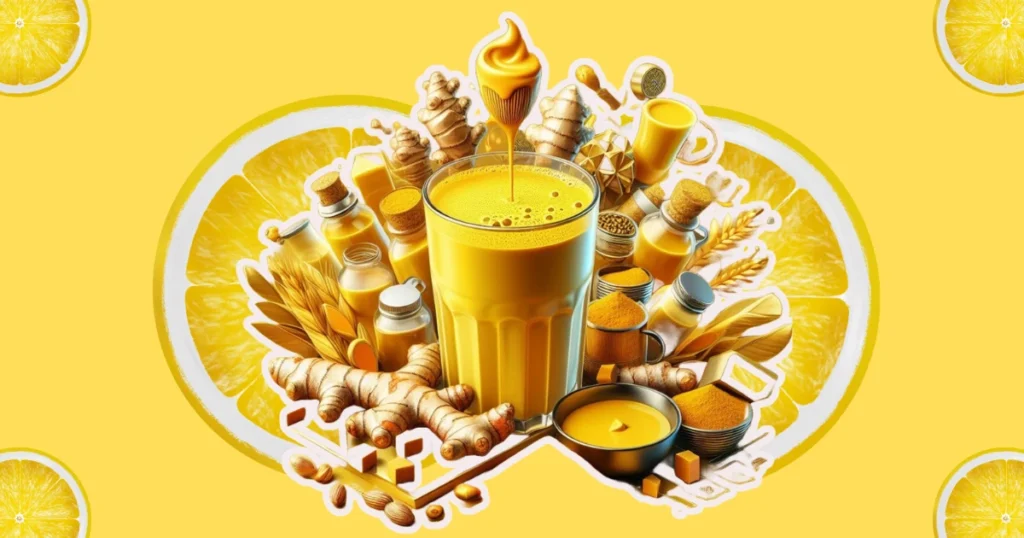
Golden milk contains antioxidants and anti-inflammatory chemicals, which may provide health advantages. Some of these may involve health protection.
Heating cow’s or plant-based milk along with turmeric and a blend of other spices like cinnamon and ginger creates this traditional beverage, known for its vibrant yellow color.
It’s known for its numerous health advantages and is frequently used as an alternative medicine to strengthen immunity and prevent sickness.
Golden milk ingredients
The main ingredient in golden milk is turmeric, a yellow spice common in Asian cuisine that gives curry its yellow hue.
Milk: Coconut milk is my preferred choice due to its high fat content, which helps in absorbing the healing properties of turmeric. However, feel free to use your preferred dairy or dairy-free alternatives like almond milk, cashew milk, or oat milk.
Turmeric: Ground turmeric is the recommended option for this recipe, as it is commonly found in most spice drawers or cabinets.
Spices: I personally enjoy adding a touch of cinnamon and black pepper to enhance the effects of curcumin in turmeric. For an additional spiced flavor, you can also incorporate ground ginger or cardamom.
Sweetener: While I usually opt for maple syrup or honey, the choice of sweetener is entirely up to you!
The benefits of golden milk
Below are ten evidence-based advantages of turmeric milk, along with instructions for preparing it at home.
1. Help reduce inflammation and joint pain
Golden milk contains excellent anti-inflammatory effects.
Chronic inflammation is thought to play a significant role in many chronic diseases, including cancer, metabolic syndrome, Alzheimer’s, and heart disease. As a result, diets high in anti-inflammatory chemicals may lower your risk of certain illnesses.
Research reveals that ginger, cinnamon, and curcumin—the main element in turmeric—have significant anti-inflammatory benefits.
According to studies, curcumin’s anti-inflammatory effects are equivalent to those of some pharmaceutical medications, but without the adverse effects.
These anti-inflammatory properties may help with joint discomfort from osteoarthritis and rheumatoid arthritis.
For example, a study of 45 people with rheumatoid arthritis discovered that 500 milligrams of curcumin per day reduced joint pain by more than 50 grams of a typical arthritis The drug can be used alone or in conjunction with curcumin as a form of medication. Similarly, in a 6-week study of 247 people with osteoarthritis, those given ginger extract reported less pain and needed less pain medication than those given a placebo.
2. Supports brain health
Additionally, golden milk has potential benefits for cognitive health. Research has demonstrated that curcumin can increase the synthesis of brain-derived neurotrophic factor (BDNF), a key element that assists in the creation of fresh neural pathways and encourages the multiplication of brain cells.
Low levels of BDNF may be connected to brain illnesses like Alzheimer’s disease. Other ingredients may bring further benefits.
For example, one of the characteristics of Alzheimer’s disease is the buildup of a specific protein in the brain known as tau protein. Test-tube and animal studies suggest that the chemicals in cinnamon may help minimize this accumulation.
In animal studies, cinnamon has shown potential for reducing the symptoms of Parkinson’s disease and enhancing brain function. Additionally, ginger has been found to improve reaction time and memory, thus potentially benefiting brain function. However, it is important to note that more research involving humans is required to comprehensively comprehend the impact of these ingredients on memory and brain function.
3. Improve mood
A 6-week study was conducted to investigate the effects of turmeric, particularly its active compound curcumin, on mood enhancement and the reduction of depression symptoms. The study involved 60 participants diagnosed with major depressive disorders who were randomly assigned to three groups: curcumin, antidepressants, or a combination of both.
The results of the study revealed that individuals who received curcumin alone showed comparable improvements in their condition to those who were given antidepressants. However, it was the combination group that reported the most significant benefits in terms of mood enhancement and reduction of depression symptoms.
Depression may also be associated with decreased levels of brain-derived neurotrophic factor (BDNF). Curcumin appears to increase BDNF levels, which may help to alleviate depressive symptoms.
However, few studies have been conducted in this area, and more are needed before firm conclusions can be drawn.
4. Promotes heart health
Heart disease is the world’s biggest cause of death. It is of interest to mention that cinnamon, ginger, and turmeric, which are the main elements in golden milk, have all been associated with a diminished risk of heart disease.
For example, a review of ten studies found that taking 120 mg of cinnamon daily may lower total cholesterol, triglyceride, and “bad” LDL levels while increasing “good” HDL levels.
In another trial, 41 people with type 2 diabetes received 2 grams of ginger powder each day. At the end of the 12-week study, assessed risk factors for heart disease had decreased by 23-28%.
Curcumin may also increase the function of your blood vessel linings, a process called endothelial function. A healthy heart depends on proper endothelial function. A healthy heart depends on proper function.
In one trial, patients undergoing heart surgery were given either 4 grams of curcumin or a placebo a few days before and after the procedure.
Curcumin-treated patients were 65% less likely to have a heart attack during their hospital stay than the placebo group.
These anti-inflammatory and antioxidant characteristics may help prevent heart disease. However, studies are few and far between, and more are required before firm conclusions can be drawn.
5. Antiviral and Antifungal Properties
In India, golden milk is a popular home cure for colds. In fact, the yellow drink is known for its immune-boosting effects.
According to test tube research, curcumin contains antibacterial, antiviral, and antifungal characteristics that may aid in the prevention and treatment of infections.
Although test-tube studies show promise, there is currently no evidence that golden milk decreases human illnesses.
Furthermore, chemicals found in fresh ginger may hinder the growth of certain germs. Ginger extract may be effective against the human respiratory syncytial virus (HRSV), a common cause of respiratory illnesses.
Similarly, lab tests show that cinnamaldehyde, the main ingredient in cinnamon, may inhibit the growth of germs. It may also help cure fungi-caused respiratory tract infections.
Golden milk contains significant antioxidant and anti-inflammatory characteristics that may strengthen your immune system.
6. Reduce the risk of cancer
Alternative anti-cancer remedies are becoming increasingly popular alongside conventional treatments. Interestingly, research indicates that the spices used in golden milk may have some potential benefits in this area. For example, certain studies conducted in test tubes have suggested that 6-gingerol, a substance abundant in raw ginger, possesses anti-cancer properties.
Similarly, laboratory and animal studies have reported that compounds found in cinnamon could potentially inhibit the growth of cancer cells. Additionally, curcumin, the active component in turmeric, has shown the ability to eliminate isolated cancer cells in test tubes and hinder the formation of new blood vessels in tumors, thereby limiting their spread.
However, it is important to note that the evidence supporting the cancer-fighting properties of ginger, cinnamon, and curcumin in humans is currently limited. Furthermore, the results of various studies are conflicting, and the optimal dosage of each ingredient required to potentially achieve these benefits remains unclear.
7. Improve digestion
Chronic indigestion, also known as dyspepsia, causes pain and discomfort in the upper section of the stomach.
Indigestion may result from delayed stomach emptying. Ginger, one of the constituents in golden milk, may aid with dyspepsia by speeding up stomach emptying.
Further research indicates that turmeric, another component used to make golden milk, may help alleviate gastrointestinal symptoms. Turmeric may aid fat digestion by increasing bile production by as much as 62%.
Finally, studies demonstrate that turmeric can help maintain good digestion and reduce flare-ups in people with ulcerative colitis, an inflammatory digestive illness that causes ulcers in the gut.
How to Make Golden Milk
Making golden milk at home is a simple task. To prepare a single serving, or approximately one cup, just adhere to this recipe:
Ingredients:
- 1/2 cup (120 ml) of unsweetened milk of your preference;
- 1 tsp. of turmeric
- 1 small piece of freshly grated ginger
- 1/2 tsp. of ginger powder
- 1/2 teaspoon of cinnamon powder
- 1 pinch of ground black pepper
- 1 tsp. of honey or maple syrup (optional)
Instructions:
To prepare the golden milk, combine all the ingredients in a small saucepan or pot and bring them to a boil. Once boiling, reduce the heat and let it simmer for approximately 10 minutes until it becomes fragrant and flavorful. Afterward, strain the mixture through a fine strainer into mugs and garnish with a pinch of cinnamon. If desired, golden milk can be made in advance and stored in the refrigerator for up to five days. Simply reheat it before consumption.
The bottom line
Golden milk is a delicious drink abundant in antioxidants that has the potential to offer a range of health benefits, such as promoting a healthier brain and heart, strengthening bones, aiding digestion, and lowering the risk of disease.
To gain the maximum health advantages, choose milk that has both calcium and vitamin D, and limit the quantity of honey or syrup you add to your drink.


